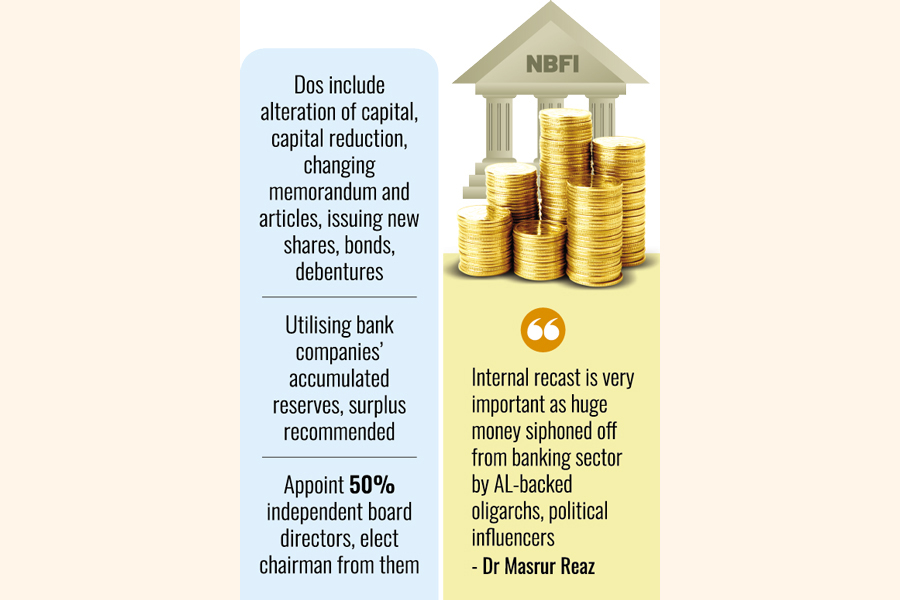To avert printing money for feeding lenders
Internal recast of scam-hit weak banks, NBFIs imperative
An intel agency suggests bail-in to rid them of crisis

Published :
Updated :

A package remedy is now offered for the rescue of scam-hit weak lenders through bail-ins like mergers and acquisitions or guaranteed securities issuance of bank companies to avert printing money needed to feed them.
Officials say a top national intelligence agency has made the suggestions for the government to take internal recast scheme for the country's scam-ridden banks and non-bank financial institutions in order to make progress in shoring up their overall operational positions.
The intelligence entity believes if this reconstruction scheme is approved and implemented under High Court orders, there will be no need to print money for injecting in the crisis-stricken companies.
Insiders said the National Security Intelligence (NSI) recently submitted 17-point recommendations that include alteration of capital, capital reduction with approval from the High Court, changing memorandum and articles, issuing new shares, bonds and debentures.
It mentions that the boards of directors of the 11 crisis-ridden banks, including Islami Shariah-based and conventional banks, have been abolished and new boards formed. But no significant progress has been made by the reconstituted boards.
The agency has advocated for restructuring debt and workforce and also reducing and revaluating the companies' costs and assets respectively.
Also proposed is utilising bank companies' accumulated reserves and surplus, if any.
The agency suggests taking proper process for recouping the ailing banks as "widespread fraudulent financial malpractices" happened in the banks.
"Otherwise, recovery moves would fail even after the board reconstitution."
Currently, the government and the Bangladesh Bank (BB) are discussing with the International Monetary Fund (IMF) the necessity of reformation and reconstruction of the banking sector. The international lender has shown a positive attitude about the dos.
On April 04, 2024, the central bank issued the country's first-ever Bank Company Mergers Policy, outlining both voluntary and agreed mergers and forced mergers.
Under the rejig policy, the central decided on mergers of some banks. The regulatory initiative did not see success because of different complexities.
The then Sheikh Hasina government had injected special liquidity by printing money on special considerations to protect some crisis-ridden lenders.
It is pointed out that the current post-uprising government goes by the same policy. The BB fed some Tk 225 billion to the weak banks through printing currency notes. But, after receiving the liquidity support, they are unable to turn the corner.
The central bank has also made multiple moves to rescue the banks from the quicksand of crisis. It has already appointed big-name global firms to conduct a detailed assessment of some crisis-hit banks in order to identify core issues causing problems and to undertake reforms that pay.
The intelligence suggests taking different necessary steps with the shareholders, creditors, and bond-and debenture-holders under sections 228 and 229 of the Bank Companies Act.
It opines for the issuance of ordinary shares, preference shares, bonds of the companies to the depositors for payment or reduction in their liabilities and debts.
Also suggested is liquidation of accumulated losses of the companies, making arrangements for disposal of all intangible assets in the organisations.
In the package remedies are also arranging sale of excess assets and investments of a company to meet the financial needs of the company and to reorganise the management authority of the company and re-organise the board management to establish good corporate governance.
It advises keeping 50-percent independent directors on the board of directors, electing the chairman of the bank company from the independent directors and that a certain number of independent directors must have relevant business knowledge.
The national security watchdog recommends scrutinising by the BB in case of selection of individual directors, after sending a proposed list from the bank concerned.
It also recommended not to keep more than two members from the same family on the board of directors of a bank.
A prominent economist and public-policy expert, Dr M. Masrur Reaz, believes internal reconstruction of the problem banks is very important as a significant amount of money has been siphoned off from the banking sector by Awami League-backed oligarchs and political influencers.
"Currently, the central bank is looking into the ailing banks to overcome the existing problems," he told The Financial Express.
Mr. Reaz suggests taking requisite steps so that the banks are operated under good governance and transparency.
"Efficient management in any bank company is needed to avoid any financial irregularities in the banking sector," he says.
rezamumu@gmail.com


 For all latest news, follow The Financial Express Google News channel.
For all latest news, follow The Financial Express Google News channel.